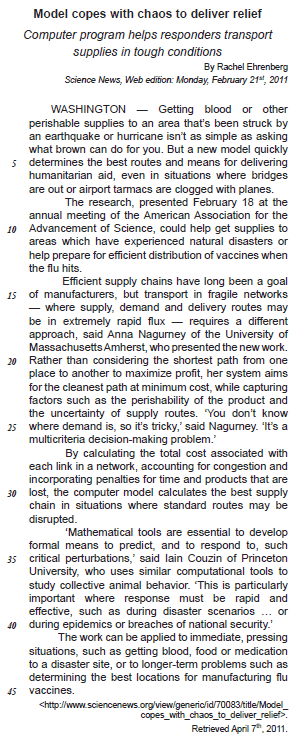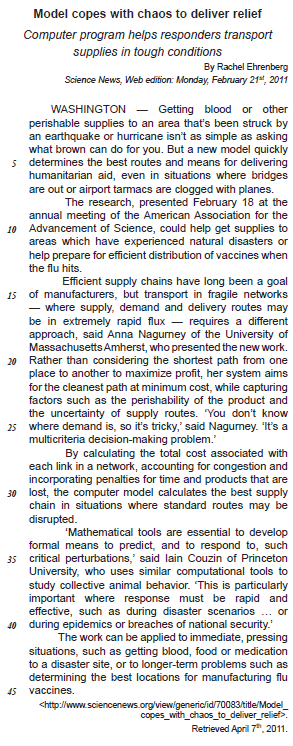Questões de Língua Inglesa do ano 2011
Lista completa de Questões de Língua Inglesa do ano 2011 para resolução totalmente grátis. Selecione os assuntos no filtro de questões e comece a resolver exercícios.

The word may in They may be lawyers, accountants, your next-door neighbor, (lines 40-41) expresses
- A.
ability.
- B.
advice.
- C.
certainty.
- D.
necessity.
- E.
possibility.

In terms of reference,
- A.
...them. (line 5) refers to ...advisors... (line 3).
- B.
which... (line 24) refers to discussions... (line 23).
- C.
Many... (line 35) refers to ...members... (line 33).
- D.
They... (line 40) refers to ...hazards (line 36).
- E.
...whom... (line 51) refers to ...ailments, (line 49).

In paragraph 9, Dr. Jeff Kalina affirms that Petroleum has inherent hazards... (line 53) because he feels that
- A.
it is neurologically harmful for the family of workers in oil rigs.
- B.
the health risks associated with oil prospection are completely unpredictable.
- C.
the damages it causes on the environment are intrinsic to the way oil is being explored.
- D.
direct exposure to the chemicals it contains can cause different kinds of health disorders.
- E.
all of the risks associated with the oil production are known but are not made public.

In replacing the word if in the sentence If petroleum gets into the lungs, it can cause quite a bit of damage to the lungs [including] pneumonitis, or inflammation of the lungs. (lines 57-60), the linking element that would significantly change the meaning expressed in the original is
- A.
in case.
- B.
assuming that.
- C.
supposing that.
- D.
in the event that.
- E.
despite the fact that.

In the fragments to look at what we know and what are the gaps in science, (lines 20-21) and They may be lawyers, accountants, your next-door neighbor, he pointed out. (lines 40-41), the expressions look at and pointed out mean, respectively,
- A.
face revealed.
- B.
seek deduced.
- C.
examine adverted.
- D.
investigate estimated.
- E.
glance at mentioned.

Based on the information in the text, it is INCORRECT to say that
- A.
Dr. Maureen Litchveld feels that it is important to learn more about the immediate and future effects of oil extraction on the workers and surrounding population.
- B.
Dr. Nalini Sathiakumar considers that the civilians in the neighboring cities do not need to worry about seafood being contaminated.
- C.
Dr. Jeff Kalina believes that production workers involved in the field where the oil spill occurred run the risk of suffering from respiratory problems.
- D.
Dr. Robert Emery speculates whether the workers in the field of the disaster might need other devices to prevent further health problems.
- E.
Dr. Paul Lioy remarks that not all volunteers cleaning up the damage to the environment have received proper training on how to deal with such situations.

The communicative intention of the article is to
- A.
criticize the inefficient transportation of supplies during stressful events.
- B.
announce a study to identify an effective strategy to distribute goods and services in emergencies.
- C.
alert society about the arguments against the delivery of humanitarian aid during natural disasters.
- D.
report on a computational model to speed up the shipment of perishable products through clogged roads in summer.
- E.
argue that the building of alternative highways is paramount to a more efficient distribution of supplies in everyday situations.

such critical perturbations, (lines 34-35) refers to all the items below, EXCEPT
- A.
congestion
- B.
delivery delays
- C.
computer supplies
- D.
disrupted roads
- E.
loss of products


The communicative intention of Text I is to
- A.
classify all the economic risks Brazil will certainly run if it insists on extracting oil at great depth.
- B.
suggest that Brazil could soon be ranked as one of the four main oil producers in the whole world.
- C.
argue that Brazil should try to avoid potential dangers associated to its recent deepwater oil discoveries.
- D.
report on the rising tensions between China and Brazil over the manufacturing sector of the world economy.
- E.
announce the expected growth of the oil industry in Brazil, Nigeria and Venezuela in the coming decades.

=According to paragraphs 9 and 10 (lines 55-65), investing in R&D
- A.
may open new markets for the Brazilian technological sector of oil extraction at great depth.
- B.
may justify Petrobras plans to reduce the development of its research center.
- C.
is surely leading Brazilian engineers to work for African countries rich in natural resources.
- D.
will pay immediate dividends in the challenging sector of geology and oil exploitation.
- E.
can explain why Petrobras is spending $800m - $900m to extract oil at great depth.


